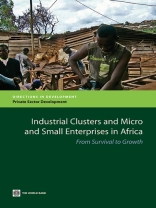The World Bank, Japan International Cooperation Agency (JICA) Research Institute, and the Foundation for Advanced Studies on International Development (FASID), in collaboration with researchers affiliated with the African Economic Research Consortium (AERC), recently conducted a study on Africa’s domestic enterprises to improve the understanding of the constraints micro and small enterprises in Africa face in improving productivity and expanding their markets.In Africa, there are stark performance gaps between domestically owned enterprises and foreign-owned enterprises in terms of sales performance, productivity, and ability to reach distant markets. Among others, size appears to be a dominant factor in explaining the gap. Against this background, the study analyzes how naturally formed industrial clusters-concentrations of enterprises engaged in same or closely related industrial activities in specific locations-could potentially mitigate constraints Africa’s micro and small enterprises face and enhance their business performance. The study is one of the first comprehensive quantitative inquiries on industrial clusters in Africa.The analysis specifically focuses on the role of spontaneously grown clusters of light manufacturing industries based on a set of original case studies of industrial clusters conducted for this research project. One of the key findings from the case studies was that cluster-based micro and small enterprises are performing better than similar micro and small enterprises outside of the clusters in terms of sales performance and ability to reach distant markets. Market access is a leading reason for cluster-based enterprises to choose their current locations.However, cluster-based enterprises face another set of unique growth constraints. By the very nature of spontaneous agglomera tion, new enterprises continue to flow to the clusters seeking the profit opportunities and better access to markets at such locations. The result can be intense competition in addition to increased congestion. Space constraints often impede growth within clusters. The lack of alternative locations available for industrial activities in the same cities, generic infrastructure bottlenecks, and unclear zoning policies and their unpredictable changes limit firms’ location choices and constrain their mobility. While competition should improve efficiency, lack of capacity among those competing cluster-based enterprises to invest and innovate does not generate growth out of the competition. The vast majority of naturally formed clusters of light manufacturing industries in Africa are still at a "survival" level, where agglomeration externalities are only limited to expand quantity but not quality as we observe in more advanced innovation-oriented clusters in elsewhere in the world.Existing studies on such natural industrial clusters in Africa have found that the lack of managerial skills among entrepreneurs running micro and small enterprises is a major constraint for innovation and growth in the clusters. As a part of this study, pilot managerial skills training programs were conducted in two industrial clusters on an experimental basis, where a group of randomly selected entrepreneurs within the clusters were given three-week long crush course of based management such as bookkeeping, marketing, business planning, and production management. The impact evaluation of the experiments showed significant positive impacts of the training programs on value added and gross profits of enterprises.Raising the current survival-type industrial clusters, which have been formed as a coping mechanism to weak investment climate, into more dynamic innovating clusters will be an important avenue for fostering growth of micro and small enterprises in Africa. While national efforts to improve investment climate and investments in human capital are undoubtedly important, there could be more targeted policies to be formulated, in compl
World Bank
Industrial Clusters and Micro and Small Enterprises in Africa [EPUB ebook]
From Survival to Growth
Industrial Clusters and Micro and Small Enterprises in Africa [EPUB ebook]
From Survival to Growth
购买此电子书可免费获赠一本!
语言 英语 ● 格式 EPUB ● ISBN 9780821386286 ● 出版者 The World Bank ● 发布时间 2010 ● 下载 3 时 ● 货币 EUR ● ID 5845601 ● 复制保护 Adobe DRM
需要具备DRM功能的电子书阅读器












